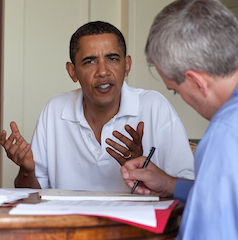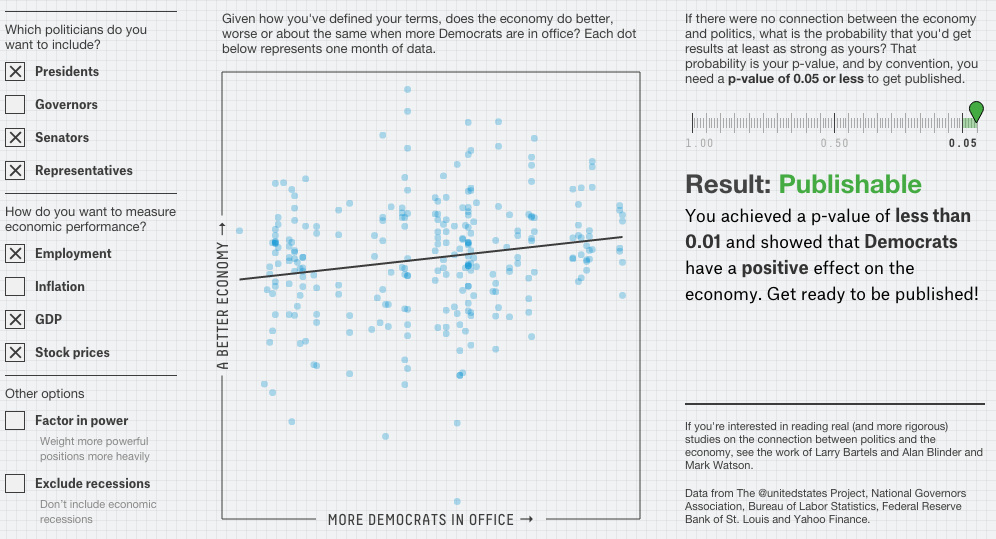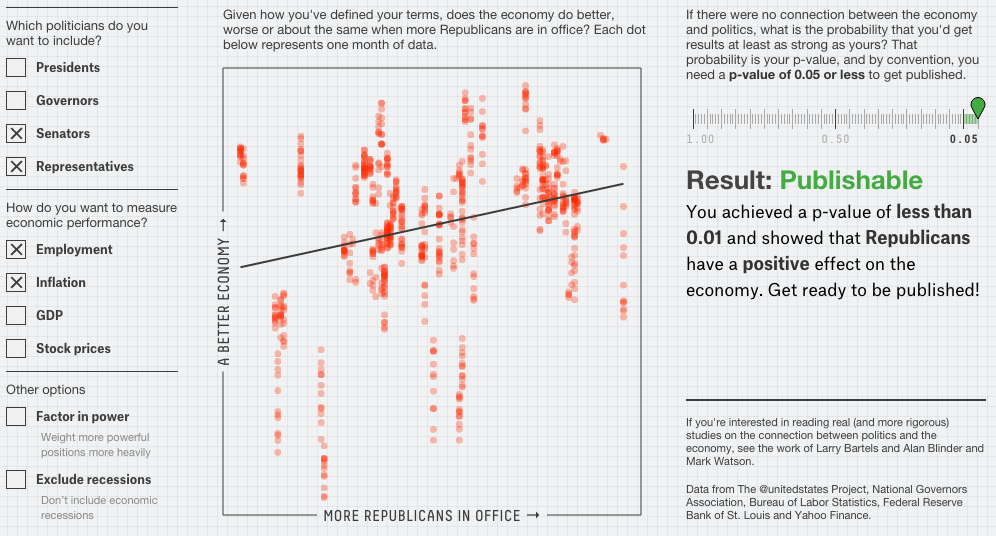Who’s better for the economy, Democrats or Republicans?
 I set out to learn which party did a better job for the American economy. What I found out taught me more about data than politics. In a time of market-based panic and bloviating presidential candidates, we need thoughtful data analysis, not empty rhetoric.
I set out to learn which party did a better job for the American economy. What I found out taught me more about data than politics. In a time of market-based panic and bloviating presidential candidates, we need thoughtful data analysis, not empty rhetoric.
Here’s a challenge for you. Just for a moment, try not to think as a democrat, a republican, a liberal, or a conservative. Try to read this as someone seeking the truth.
A correspondent sent me a link to this article in Forbes, which proves that if you want a better economy, you should vote Democrat. For example:
- Personal disposable income has grown nearly 6 times more under Democratic presidents
- Gross Domestic Product (GDP) has grown 7 times more under Democratic presidents
- Corporate profits have grown over 16% more per year under Democratic presidents (they actually declined under Republicans by an average of 4.53%/year)
Hmm. I thought Republicans were the party of business. And sure enough, The Economist rebuts this theory.
Much of the growth under Democratic presidents has been the result of private-sector investment and increased consumption. They have been blessed with lower oil prices, larger increases in productivity and better global economic conditions. The timing of Democratic presidents appears impeccable compared with Republicans—Mr Clinton took office just as the technology sector began to boom, whereas George W. Bush could not get out before the financial crisis.
What’s really going on here? Well, there is an enormous amount of economic data. Democrats and Republicans regularly trade power in the White House and Congress. And depending on how you pick your definition of “in power” and “economic conditions,” you can get any answer you want.
An amazing article by Christie Aschwanden on fivethirtyeight.com illuminates this through the phenomenon of “p-hacking,” which is as common as dust in every scientific discipline. You gather your data. You look for correlations and powerful effects. You try different combinations of variables. And since there are thousands of possible combinations, just by chance, you’re likely to find an only-one-time-in-a-hundred effect. That’s how randomness works: examine more than 100 possibilities and you’ll find one that’s significant at the 1% level, just by chance.
Sure enough, using the really cool p-hacking tool on that site, I proved that under Democratic Presidents and Congresses, unemployment, GDP, and stocks are better:
Of course, if you look specifically at Congress only and examine the factors that matter most (that is, make for the most dramatic effect), employment and inflation, then Republicans are better stewards of the economy.
This is not truth. It’s bullshit. With this tool, you can get any result you want. That’s how demagoguery works — find the data that supports your economic theory and flog the hell out of it.
Here’s the truth and the bullshit when it comes to presidents, lawmakers, and the economy.
- There are thousands of factors that affect the economy. Many of them, including oil prices, Chinese leaders wrestling with market dynamics, sectarian conflict in the Middle East, and Greek brinksmanship, are out of the control of American politicians. They’re powerful, but not all-powerful.
- The Federal Reserve Bank has more of an impact on the economy than actions of presidents and congresses, and it doesn’t shift according to transitory Democratic and Republican ideas.
- Most economic interventions by politicians take years to have an effect. This means by the time something goes wrong (or right), the other guys may be in power.
- Some policies increase both prosperity and risk. If you drive too fast you’ll often get where you’re going sooner, unless of course you have a disastrous accident on the way. People who advocate risky policies often reside over prosperity.
- The biggest risk is the one we haven’t seen before. As much as you want to blame politicians for failing to anticipate and account for the risk of a real-estate/tech/stock/bond/China/derivative bubble, nobody gets political cover for legislating against a risk that hasn’t happened yet. So there is no action, only blame. Ultimately, we all share that blame.
- Presidents don’t get to set policy. Neither do congresses. They either negotiate a result or fail to act at all. Either way, we get a result that’s neither Democratic nor Republican, but a mix of the two. This makes it hard to assign credit and blame.
- Stocks go up. Stocks go down. Is Obama supposed to get credit for the long rise in stocks, or is that due to the Republican-controlled Congress, or just due to the fact that things were so depressed when he got started? Is he to blame for the recent drop, or is that just the inevitable “correction” that happens after a runup? It’s all just hot air. When your 401(k) goes down (or up), the appropriate response is not “Thanks, Obama!”
Choose your politician based on the policies they espouse. Do you want more regulation, or less? Do you want action on global warming, or not? Do you want international engagement and the risk that comes with it, or protectionism and the risks that come with that? Make a smart decision. Sure, politicians affect the economy, but they sure can’t take credit for it.
Photo: Pete Souza of the White House via Wikimedia Commons
Graphics: fivethirtyeight.com


Found this on another site, but thought it relevant, since you brought up climate change. Here’s a couple of the most distinguished people in the field telling the UK government that most of the other people in the field are rubbish, the science is NOT “settled,” and that “doing something” may, indeed, by worse than doing nothing. It’s one thing to hear the Rush Limbaugh’s of the world saying such things. It’s quite another to hear it directly from credentialed people like these. Maybe these are the “deniers” that the “majority” of climate researchers mock, but I can’t see how, given their resumes. Just thought it was fascinating. It would be interesting to get a “without bullshit” examination of this.
Thanks for sharing, but this just isn’t very convincing.
When people talk past each other on an issue like this, I see no point in arguing further.
I really don’t think I can convince anybody on the other side. Until sea levels start to rise, I won’t try.
Josh – When I ready your words, ‘you can get any answer you want’ it made me think of a scene from a UK TV series from the 80s called Yes Prime Minister. Enjoy:
Sorry. Wrong clip. It should be this one:
Wow. I knew there was somebody out there that could makes sense of the BS… Thank you for putting this together so succinctly. I can’t predict where the 2016 election will lead, but I hope we can get more information out there like this. What are the facts? What are the actual numbers? Maybe some day we’ll have a media organization that believes in these principles too… I am grateful for the interwebs…
There’s a lot more to “Bulls, Bears, and the Ballot Box” than p-hacking. The book is actually worth the read.
Your data is rubbish.
Real data shows that the last 46 years of the US economy was better under Republican control of both Houses of Congress and especially with a Republican President coinciding.
Total BS. Data from this fucking moment shows that Bush 1 economy sucked, Clinton’s 90s were prosperous, Bush2 destroyed the economy and Obama has been a correction course. If the liberals give it back to the Conservatives now, then we will only lose more of the middle class to poverty. Republican presidents are war mongers, corporate puppets. Democrats are charismatic and thoughtful. Hillary is far from charismatic, but possibly the most intelligent and pragmatic candidate we’ve ever had
Your analysis of the fivethirtyeight model is rather superficial. While it is true that you can get it to spit out either answer you prefer (R or D), it is much harder to get the R result. In almost all cases you have to exclude (as you did) GDP, a more or less unambiguous measure of economic activity, to get a publishable R result. In other words a meta analysis of the tool’s possible outcomes seems to yield an overall D result despite the fact that some R results are obtainable.
I always amazed when a liberal speaks highly of democrat job creation because it is always derived from some form of taxation rather than a real economy that a true capitalist promotes. The establishment demo a reps are both socialist piles of crap. You liberals ideas are to tax away any savings of the responsible and give to the irresponsible. Personally I have no moral obligation to care for another unless they are family, friends, or fellow citizens that behave appropriately. I am telling you that if you are rude, out of line and living off my dime … I could care less about you.take the high road condemning me, you are the same … you liberals use this as an excuse to steal income from others through taxation.
Read the post — it’s about using statistics unfairly to support your case. My critique of people who make broad generalizations about large groups of people — like you for instance — is completely different.
Ben, you are absolutely right.
Actually, you can’t get any result you want, except in broad terms.
With this tool, you can see where the Republicans are better and where the Democrats are better, but! …the result I want is to figure out how to combine the two approaches to achieve the best of all worlds — which this tool can’t help with.
What I learned from this article is that there is more to achieving a great economy than just who the president is and what party is in office. There are world conditions, timing and “luck”, which helps or hurts the success of a presidency. However, to me there’s more to a successful presidency than the economy. I’m a happier person under the Republicans because of their ideology, and principles of good character. Democrats believe in things that I hate, like abortion, illegal immigrantion, Islamic migration, high taxation, disdain for freedom of religion, enforcing gay rights above non-gay rights…much more.
This is probably true regarding federal agencies. However, 93, 000, 000 people out of the workforce under Barack Obama makes me think that democrats fudge the employment numbers to make themselves look good.